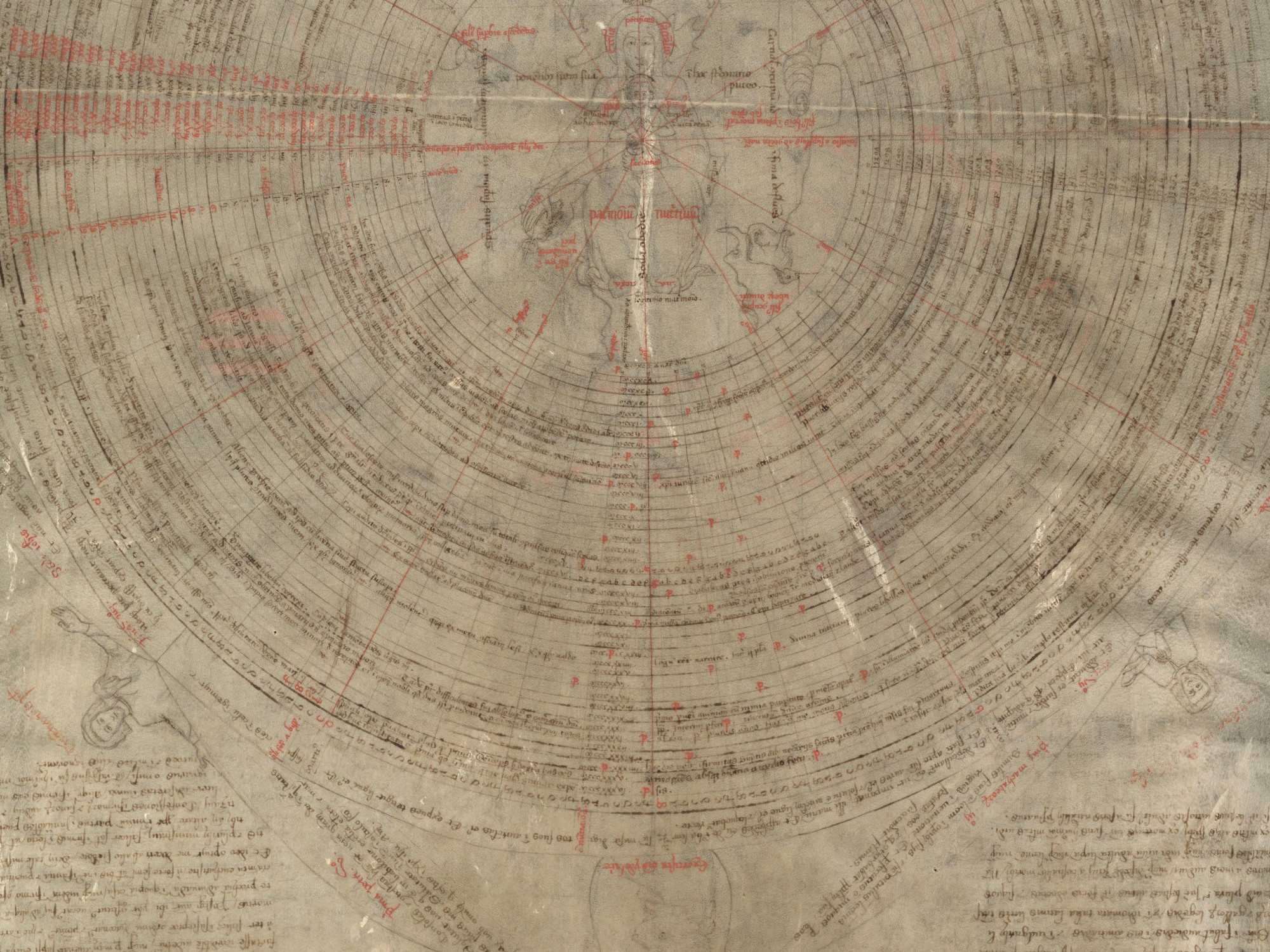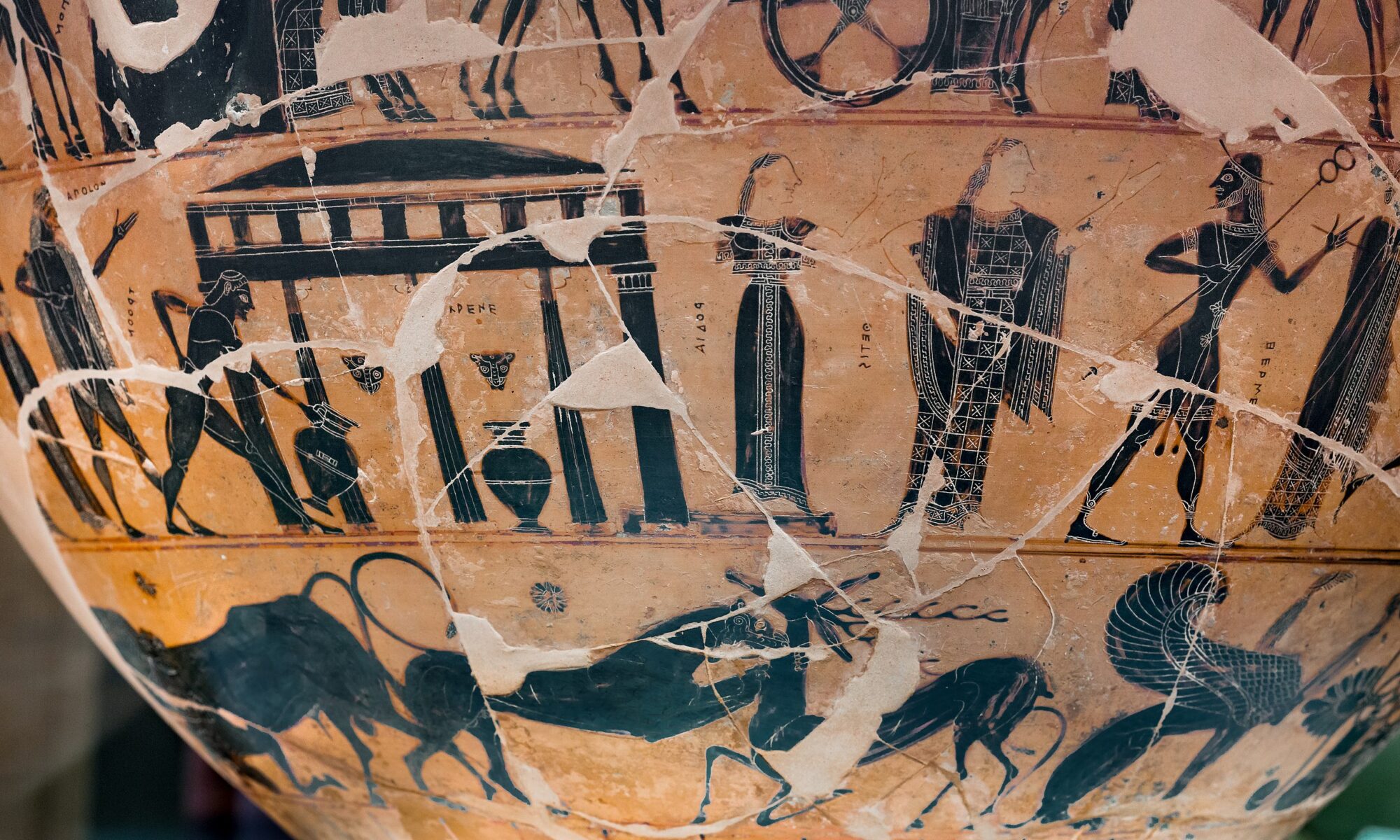In the age of Linked Open Data, the humanities have increasingly turned their attention from the mere collection of data to its modelling with ontologies and data models. In the field of Greek mythology, these approaches have started in very recent times. Alongside the creation of new databases like MANTO [1], Mythoskop [2], Theoi.com [3] and ToposText [4] (to name but a few), at least three attempts have been made to create an ontology for Greek mythology. In 2018, C. Syamili and R. V. Rekha outlined an ontology for mythical heroes with reference to Wikipedia and the Theoi project [5]. From a classicist’s point of view, R. Scott Smith of the MythLab team has written a series of blogposts with great scholarly detail, which not only address the modelling of mythical characters but also of events, objects and locations [6]. Another team of computer and information scientists have tried their hand at creating an ontology based on Theoi.com and Wikidata in 2021; they built on Syamili & Rekha’s study but significantly expanded its scope [7].
However, none of these projects have worked with the most copious source on Ancient Mythology which has been produced to date: Wilhelm Heinrich Roscher’s Ausführliches Lexikon der griechischen und römischen Mythologie [8]. Published from 1884 to 1937 in more than 100 fascicles which make up 6 volumes, it reports on individual deities, characters, creatures and (to a lesser extent) concepts, events, objects and places from Greek and Roman mythology. The result is an unparalleled collection of records and source material on more than 15,000 subjects, a number larger than that of any of the databases listed above. This vast knowledge base has to this day not been used to its full potential aside from serving as a reference work. While a full digitisation of the 14,000 colums of text interwoven with illustrations and tables is a daunting project (pending approval by De Gruyter, the publishing company which holds the rights to this work), it is certainly worth considering.
To pave the way for such a project, I have created an index file for Roscher’s Lexikon (to be published on Zenodo) featuring headwords, location (volume, fascicle, column extent), date of publication, author name(s) and subject classification – hence the tangent on ontologies for Greek mythology. This file can be not only be used as a reference in and of itself, but also to create basic items for more than 15,000 mythical entities which can then become part of a Linked Open Data hub for mythology. As a venue to create this dataset I have chosen FactGrid.
What is FactGrid?
FactGrid is a public research environment founded by Olaf Simons in 2018. Hosted by the Gotha Research Centre, it runs on MediaWiki with the Wikibase extension, which was developed by Wikimedia Deutschland in its creation of Wikidata, the RDF-based hub which connects all Wikimedia projects. Both Wikidata and FactGrid are licensed under CC-0, meaning data can be shared between the two platforms without running into legal issues. But aside from the identical licensing and familiar User Interface (which can be enhanced by using the custom FactGrid Viewer [9]), there are some striking differences between the two websites.
First of all, FactGrid not only allows original research (which is forbidden or at least strongly discouraged across Wikipedia and Wikidata) but presents itself especially to this sort of use. Second, it can only be edited by registered users, and signing up for an account is not possible without former approval. Third, users are required to use their real names (whereas in Wikidata and its sister projects, pseudonyms are the norm). Points #2 and #3 means FactGrid can afford to allow original research without risking being swamped by unsolicited data input (to avoid the term ‘spam’). The result is Linked Open Data from various genealogical and other research projects which are not only visible to the public but also widely reusable thanks to liberal licensing.
Integration with Wikidata is achieved in two ways: On FactGrid, sitelinks to the Wikimedia projects (including Wikidata) can be set to items; and like with Wikidata, these sitelinks need to be unique and distinct, meaning one and the same sitelink cannot be present in two items at the same time, and each item can have exactly one link to the German Wikipedia, the French Wikisource and so on. This feature is hard-coded in the Wikibase structure and it prevents data duplication. Wikidata on the other hand links to FactGrid Items and Properties with two custom properties (P8186 and P10787).
Goals for a mythical dataset on FactGrid
What can hoped to be achieved by bringing data from Roscher’s Lexikon to FactGrid? Many things come to mind, but I want to highlight two, one achievable in short-term, the other a long-term goal.
Without too much effort, a Knowledge Base of entities (predominantly characters, but also events, objects, places and concepts), which exist or have existed in Greek and Roman (and neighbouring) mythologies, can be created on FactGrid. These items can then be checked against their source (Roscher’s Lexikon) which will be linked in every item.
In the long term, this dataset can be enriched by creating additional entries not covered by Roscher’s Lexikon (as well as marking pseudo-entities which have been disproven by later scholarship), and more importantly, by adding custom statements to the individual items about (including, but not limited to): name variants, genealogy, primary sources, depictions, reception, participation in events. In theory, anyone could contribute to this process, and it would be an ideal playground for students who want to learn about LOD or mythology (or both).
While such datasets in mythology already have been or are being created (MANTO is the most ambitious project in this regard), Roscher’s data may provide a useful corrective. And by matching the dataset against external databases like MANTO, Mythoskop, Theoi.com, ToposText and Wikidata, all these projects can partake in the information provided by Roscher. And while Wikidata has great potential in creating a rich well of LOD on mythology, it is prone to interventions due to its being non-restrictive in who can edit it. This is where FactGrid comes in handy: It is customisable and freely licensed, yet contained enough to provide stability for such a project.
Why use Roscher’s Lexikon for that?
Even though research in classical scholarship tends to have a longer half-life than STEM, using an encyclopedia that was for the most part published more than a century ago will raise some eyebrows. But Roscher’s Lexikon not only still useful as repository of primary sources and outdated literature, it is a unique and valuable resource and merits the attention of our age. The argument for this can be made from three aspects:
First, scope. Although Roscher’s Lexikon mainly deals with Greek and Roman mythology (as its title suggests), it also reports on the neighbouring cultures (Assyrians, Babylonians, Celts, Egyptians, Etruscans …). While it is by no means the only encyclopedia on mythology doing so, it was the first that could make use of the advances made by Cuneiform Studies, Egyptology, Epigraphy and Religious Studies which had seen an unparalleled surge in the 19th century.
Second, scale. While complete coverage is unlikely to ever be achieved, Roscher’s Lexikon came closer to it than any previous or later encyclopedia. Its more than 15,000 headwords not only take into account nearly all mythical characters featured in Greek and Latin literature, but also named characters and deities from inscriptions (votives) or artifacts (like mosaics, vases, statues). When compared to Pauly-Wissowa, the second installment of Pauly’s Realencyclopädie der classischen Altertumswissenschaft started seven years after Roscher’s Lexikon, Roscher almost always has more homonyms (characters with the same name) than Pauly-Wissowa. And as a mention of a character is enough to warrant recognition, Roscher has far more articles overall than the Lexicon Iconographicum Mythologiae Classicae (LIMC), its successor project published between 1981–1999 (with a supplement in 2009), even though the latter is more up to date, especially on artifacts.
Third, plurality of scholarship. As already mentioned, Roscher’s Lexikon was not limited to classical Greek and Latin literature for its sources. It also relied on epigraphic and papyrological finds as well as art history and archaeology; in the latter department, the authors and editor often explicitly expressed dissatisfaction with their ability to do justice to their ambition: Scholarship in these areas was widely dispersed and had in many cases never been assembled. Considering their time and circumstances, the authors did a good job, even publishing some depictions for the first time in print; but in regards to depictions of myths, Roscher is most outdated and the LIMC should always be preferred as a reference work.
As any scholar who has researched literary sources for ancient myths will admit, Roscher’s Lexikon is still worth consulting. If this can be facilitated by shaping it into a LOD dataset, such an effort should be welcome to the scientific community.
References
[5] C. Syamili, R. V. Rekha, “Developing an ontology for Greek mythology”. The Electronic Library 36.1 (2018), 119–132, https://doi.org/10.1108/EL-02-2017-0030.
[6] R. Scott Smith, “The Ontology of Mythical Entites: Part 1”. MANTO June 11, 2020: https://www.manto-myth.org/blog/the-ontology-of-mythical-entities-part-1; id., “The Ontology of Mythical Entites: Part 2”. MANTO June 24, 2020: https://www.manto-myth.org/blog/the-ontology-of-mythical-entities-part-2.
[7] Juan-Antonio Pastor-Sánchez, Efstratios Kontopoulos, Tomás Saorína, Thomas Bebisc and Sándor Darányi, “Greek Mythology as Knowledge Graph: From Chaos to Zeus and Beyond”. Semantic Web Journal November 3, 2021: https://www.semantic-web-journal.net/content/greek-mythology-knowledge-graph-chaos-zeus-and-beyond.
[8] On Roscher’s Lexikon see most recently Udo G. Reinhardt, Hundert Jahre Forschungen zum antiken Mythos (1918/20–2018/20). Mythological Studies (MythoS) 5, Berlin/Boston: de Gruyter 2022, 19 sq. More information can be found on Wikipedia: https://de.wikipedia.org/wiki/Ausf%C3%BChrliches_Lexikon_der_griechischen_und_r%C3%B6mischen_Mythologie.

